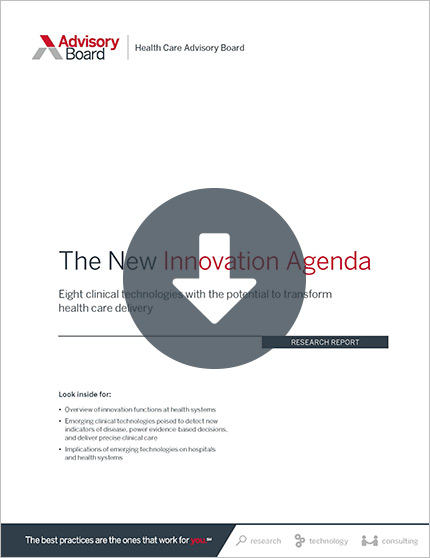Auto logout in seconds.
Continue LogoutMaryjane Behforouz spent a more than a year visiting specialists to find an explanation to the constant "clicking" sound in her ear. She'd nearly given up hope—until she found a doctor who diagnosed her condition within minutes, simply by carefully listening to her story, Sandra Boodman reports for TheWashington Post.
Here are 8 clinical technologies that could transform health care delivery
How the 'clicking' sound began
The noise, which Behforouz described as "someone clicking their fingernails together, amplified by a megaphone," began after she received a series of intratympanic steroid injections to resolve sensorineural hearing loss.
The hearing loss had occurred in July 2015. Behforouz recalled driving in her home city, Indianapolis, when her left eardrum began to itch. Behforouz pressed her fingertip to the opening of her ear and "forcefully pressed several times in quick succession," in an attempt to create enough suction to expel any potential fluid, Boodman writes. But instead of relief, she quickly experienced a decline in hearing.
Ten days later, she saw her first doctor, an ear, nose, and throat physician who suspected the hearing loss stemmed from a bacterial infection and prescribed a nasal spray and antibiotics. When the symptoms persisted, Behforouz was referred to another ENT who diagnosed her with sensorineural hearing loss, which can result from nerve cell damage in the inner ear. Behforouz did not fit the bill for any of the usual causes, but the provider recommended the inner ear steroid injections to reduce inflammation and improve her hearing.
The result was two new problems: "a high-pitched ringing sound known as tinnitus and the loud clicking noise," Boodman writes.
According to Boodman, the clicking sound was relentless. It interfered with Behforouz's sleep, concentration, and ability to hold a conversation. After a third specialist concurred with the previous diagnosis and said there was nothing more to do, Behforouz began searching for answers online.
"I kept feeling that there had to be a satisfactory explanation for the clicking and cause of my hearing loss," Behforouz said.
A final diagnosis—and a cure for the clicking
After extensive internet research, Behforouz found Konstantina Stankovic, chief of the division of otology and neuro-otology at Massachusetts Eye and Ear, a specialty hospital in Boston. Behforouz said Stankovic's "training and research indicated that she might know what was happening."
Behforouz's intuition proved correct. Stankovic examined Behforouz's medical history and had her explain the problem and how it presented itself one more time.
Five minutes into the appointment, Behforouz she "nearly fell off the chair" when Stankovic told her she suspected the noise and hearing loss stemmed from a fractured incus, a small bone in her middle ear. The "clicking" she was hearing was actually the sound of bone fragments vibrating together in response to sound.
Stankovic explained that the condition was rare. Massachusetts Eye and Ear had studied only 13 other patients with a similar injury, each of which had been caused in a similar way: by a patient creating pressure with their fingers in, or on, their ears.
According to the Washington Post, Stankovic repaired Behforouz's small fracture in an hour-long operation, after which the "clicking immediately ceased." Even though the tinnitus and diminished hearing remained, Behforouz said she was "elated."
How one specialist found an answer that other providers overlooked
It took Behforouz more than a year to identify the source of her discomfort and find relief from the frustrating clicking sound, but it only took Stankovic five minutes to come up with a diagnosis.
Stankovic said she believes Behforouz's condition "is very diagnosable" if you listen to the patient.
"It was her story that really told me what it probably was," Stankovic explained. "You really have to listen to a patient's story to even think of it" (Boodman, Washington Post, 8/18).
Here are 8 clinical technologies that could transform health care delivery
Our new report explores the clinical technology pipeline to help health care leaders become more conversant in the major vectors of innovation, leading applications of new technologies, and the business implications for established providers. Read on to unpack the new innovation agenda.
Don't miss out on the latest Advisory Board insights
Create your free account to access 1 resource, including the latest research and webinars.
Want access without creating an account?
You have 1 free members-only resource remaining this month.
1 free members-only resources remaining
1 free members-only resources remaining
You've reached your limit of free insights
Become a member to access all of Advisory Board's resources, events, and experts
Never miss out on the latest innovative health care content tailored to you.
Benefits include:
You've reached your limit of free insights
Become a member to access all of Advisory Board's resources, events, and experts
Never miss out on the latest innovative health care content tailored to you.
Benefits include:
This content is available through your Curated Research partnership with Advisory Board. Click on ‘view this resource’ to read the full piece
Email ask@advisory.com to learn more
Click on ‘Become a Member’ to learn about the benefits of a Full-Access partnership with Advisory Board
Never miss out on the latest innovative health care content tailored to you.
Benefits Include:
This is for members only. Learn more.
Click on ‘Become a Member’ to learn about the benefits of a Full-Access partnership with Advisory Board
Never miss out on the latest innovative health care content tailored to you.

